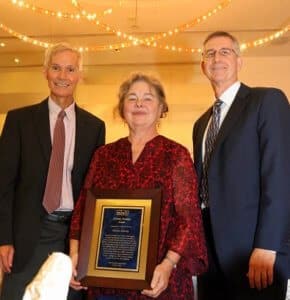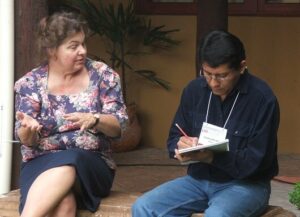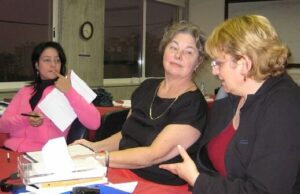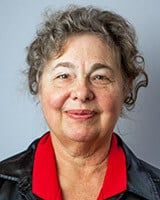
MAI presented its “Lifetime Training Award” to author Miriam Adeney at the LittWorld 2018 conference in Singapore. Authors and publishing staff from 52 nations stood and applauded the prolific author for equipping Christian leaders to think and write from a biblical worldview for five decades in dozens of nations.
We asked Miriam to describe what prompted her to train writers and to share lessons she has learned. The following article is her response.
By Miriam Adeney
When I stepped into the aroma of pork frying in garlic and the humid heat of my first Philippine assignment, my boss handed me a big pile of papers. “Rewrite all this,” he said. He was Dr. Isabelo Magalit, head of the Philippine InterVarsity Christian Fellowship. I was a summer volunteer taking a break from my M.A. in magazine journalism at Syracuse University. The papers were chapters for a book written by local IVCF staff.
Not finding a book on student discipleship that was appropriate for their context, the staff had set out to write their own. Bel Magalit had assigned topics: “Bert, you’ll write on Bible study. Josie, you write on prayer. Evelinda, you write on sin and temptation. Jonathan, you write on choosing a career. Nancy, you write on witness.” And so on. “Bring your writing back a month from today,” he added.
With no training in writing, the results were awful. But Bel faced that mess with the heart of a lion and the tenacity of a bulldog. “Everybody just hand your manuscript to the person on your right. Take it home, rewrite it, and bring it back next month,” he instructed.

During that month I arrived, and Bel plopped the pile into my hands. Being young and idealistic, I worked hard to make the manuscript clear, coherent, dynamic and substantive. Bel gave it a final polish. That book, Start Right!, went on to serve students in the Philippines, Indonesia and even Africa for decades.
Why did I start training writers? Bel Magalit prodded me, not only through this project but also by scheduling a session on “How to Write” at every staff training event and every student camp and conference. A woman named Gladys Jasper influenced me too. She worked in management and business for Alliance Publishers throughout Asia. Indigenous authors matter: both Bel and Gladys believed that passionately.
I did too. I believed every culture is a unique treasure, a special heritage, a distinctive network of patterns resulting from God’s gift of creativity to a people’s ancestors. When it comes to writing, translations do not fit in as smoothly as local writings. Translators cannot apply the whole counsel of God to a given setting as penetratingly as local authors can. Therefore it is essential to cultivate local writers.
WHAT HAVE I LEARNED ALONG THE WAY?
I have learned that writers are amazing. Each one is a world:
- Solon Karthak (Nepal) wrote in the Nepali language Three Pearls of the Creator, biographies of three early Nepali Christians.
- Hilmy Nor (Malaysia) wrote Circumcised Heart about his journey from his ancestral faith to Jesus.
- Samy (Lebanon) wrote a gritty prison novel in Arabic. (Read about Samy’s journey)
- Wannapa (Thailand) learned to start every chapter in her Bible study methods textbook with a story, written in Thai.
- John and Maggie Gathuku (Kenya) run a successful teen magazine for East Africa.
- Melba Maggay (Philippines) pours out books, national newspaper editorials, and radio and internet creations.
- Patricia Vergara (Peru), Martha Berberian (Guatemala), Ruth Padilla DeBorst (El Salvador) and Keila Ochoa Harris (Mexico) publish dozens of books in Spanish.
And so many more. How rich these writers are to me, and to their people.

I am still learning. Mature discipleship matters to me, not just faith fads. How do we build disciples through our writing? I keep struggling to do that better. A current experiment is a simple eight-chapter book on the life of David written in the Malay language by eight local authors. This is the result of a four-day workshop, a cooperative local publisher, and three local editors. If the project works, it may serve as a model for other culturally-contextualized biblical books that foster discipleship. Will it succeed? Only God knows. Anything worth doing contains risk.
When God called Moses, he answered, “Who am I?…Oh my Lord, I am not eloquent…but I am slow of speech, and of tongue…Oh my Lord, send, I pray, some other person” (Ex. 3:11, 4:13). Jeremiah, Gideon, Isaiah, and Amos also felt insecure.*
Clearly, God chooses imperfect people and uses them as His spokespersons. We have the privilege of working with Him to help train those writers.
 Miriam Adeney, Ph.D., is the author of more than 200 articles and seven books, including:
Miriam Adeney, Ph.D., is the author of more than 200 articles and seven books, including:
Kingdom Without Borders: The Untold Story of Global Christianity; Wealth, Women, and God (Women in the Arabian Gulf); Daughters of Islam: Building Bridges with Muslim Women; Refugee Diaspora; God’s Foreign Policy: Practical Ways to Help the World’s Poor; A Time for Risking: Priorities for Women; and How to Write: A Christian Writer’s Guide.
*Jeremiah said, “Ah, Lord God, I do not know how to speak, for I am only a youth” (Jer.1:6). Gideon said, “Lord, how can I deliver Israel? My clan is the weakest in Manasseh and I am the least in my family” (Judges 6:15). Isaiah confessed, “I am lost—for I am a man of unclean lips” (Is. 6:5). Amos said, “I am no prophet, nor a prophet’s son, but I am a herdsman and a dresser of sycamore trees” (Amos 7:14-15).
>Glean do’s and don’t’s for training writers in Miriam Adeney’s article, “What are the biggest challenges in training writers?“
